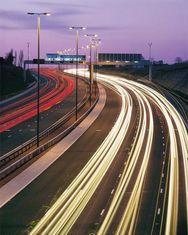
The Freight Transport Association (FTA) believes the government must heed warnings by the OECD that decades of under investment in transport infrastructure is threatening to hold back productivity in the UK economy.
The OECD Economic Survey of the UK Economy 2005, published this week, concludes that the UK ranks poorly in international comparisons regarding the quality of transport infrastructure and on congestion. The OECD said that the case for raising expenditure on strategic roads should be considered as, on current plans, spending in real terms remains well below levels in the first half of the 1990s.
FTA's chief economist, Simon Chapman, said: “The latest OECD report concludes that decades of under-investment in transport infrastructure, where capital spending was hived off as a short term expediency into current spending, has left a legacy of roads and railways which are not up to the demands of a vibrant economy competing on a world stage.
“The government has spent most of the last 10 years rebasing and reclassifying transport spending figures so that monitoring government investment performance in transport infrastructure becomes totally impenetrable. The Treasury number-crunchers have now met their match. Even after planned future rises in Government's capital investment as a percentage of GDP, the OECD report shows that UK spending on transport infrastructure will be mediocre compared to our international competitors.
“Given that the UK is starting from such a low base, that is simply not good enough. In 2004 road users faced a road tax bill of £43 billion. Yet just £1.6bn was spent on the construction and maintenance of trunk roads and motorways. UK industry and motorists deserve better.”
The OECD report concludes that road building needs to be combined with congestion charging and that with national congestion charging still at least ten years away, the focus should be on smaller scale local congestion charging schemes.
Chapman added: 'Using charges to influence when and where people travel and goods move is all well and good as part of a long term solution to the problems of rapidly increasing congestion. However, the government must not get carried away with the apparent growing public acceptability of congestion charging in London.
“Local congestion charging schemes must not be used to paper over the cracks of a bodged investment job. For industry, London congestion charging has just added cost and delivers little benefit in terms of improved journey times. Relying on such schemes to get the UK between now and the introduction of national road pricing many years in the future will simply reduce competitiveness and raise prices on the high street.”